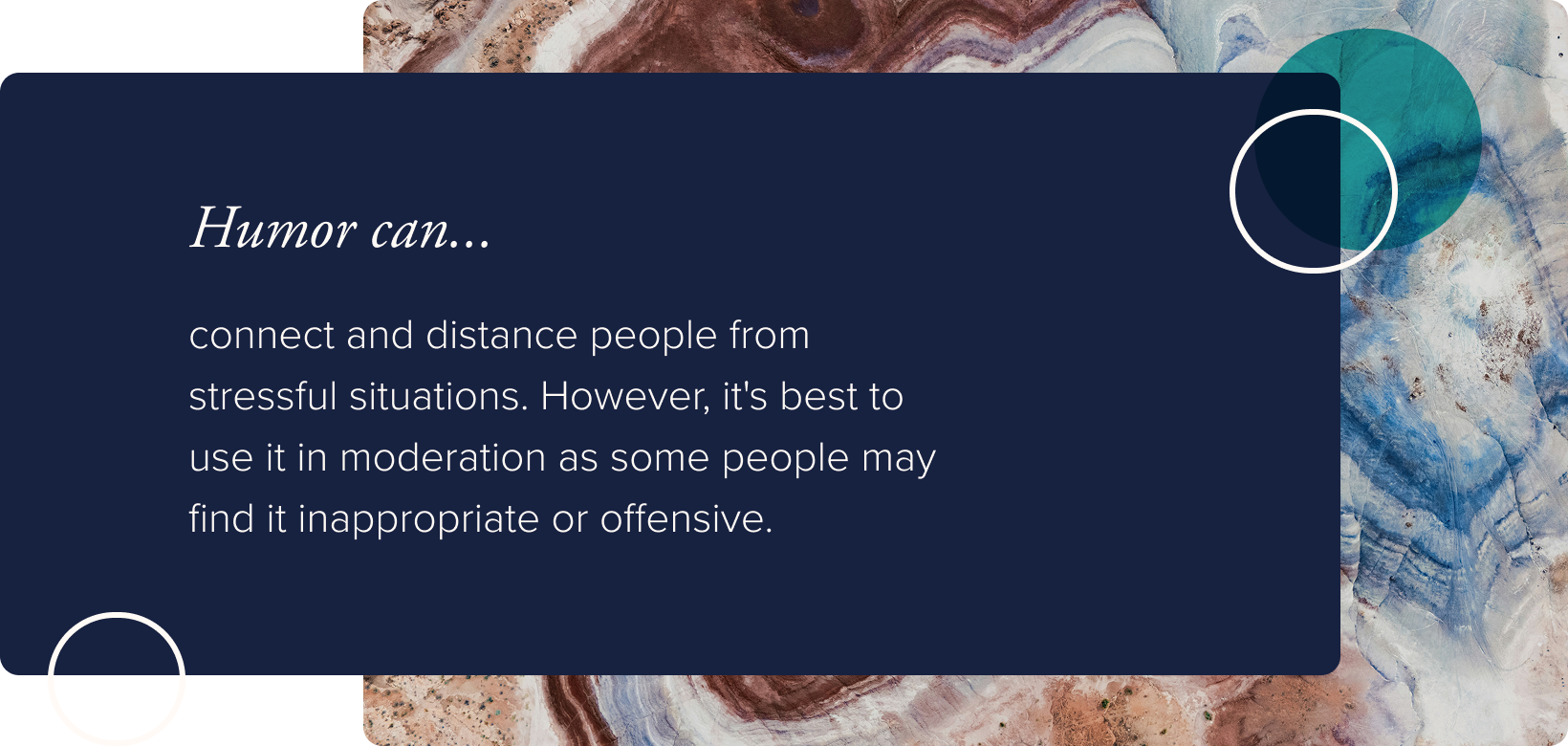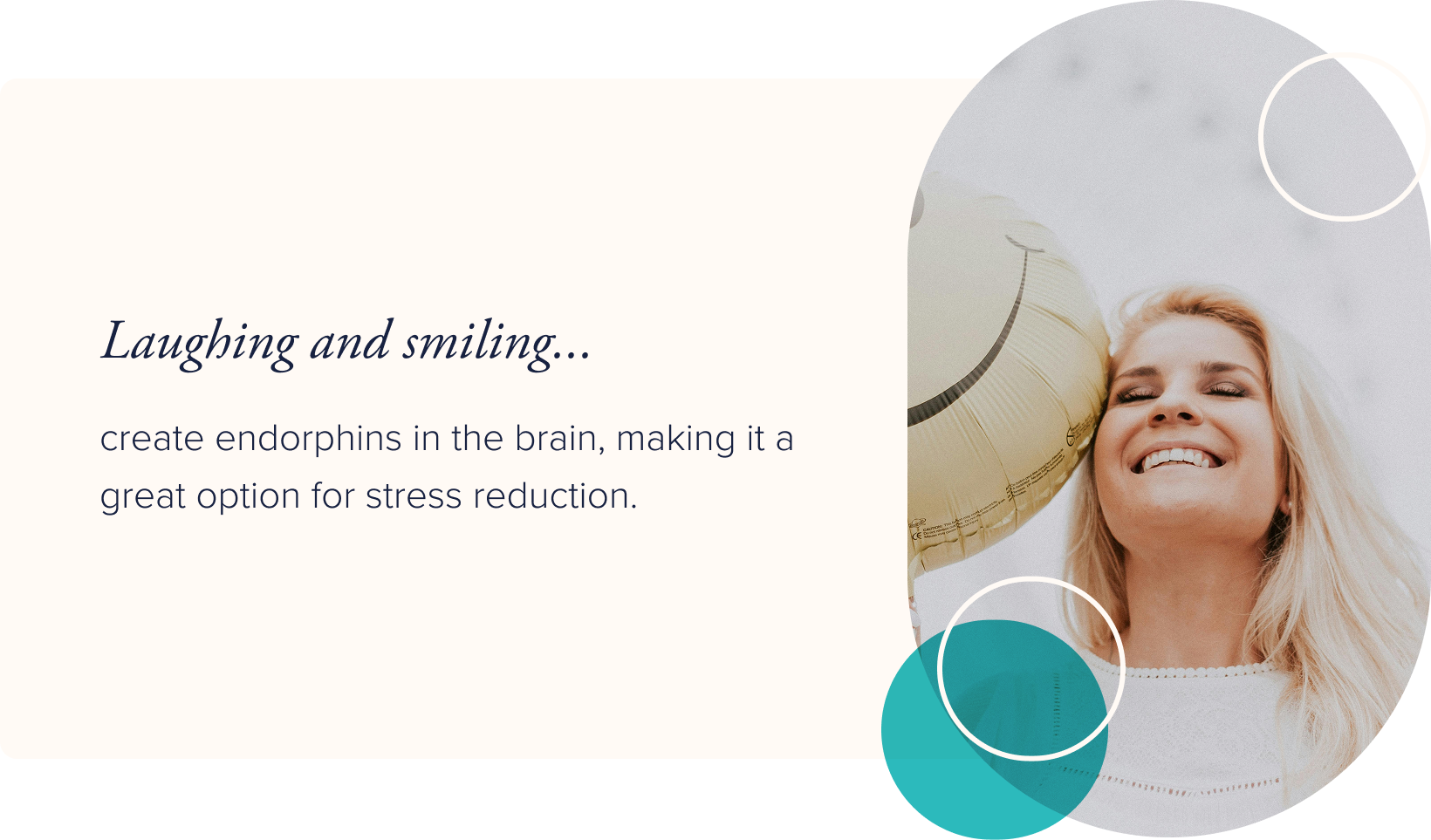
Using Humor as a Coping Mechanism

One-on-One Counseling in Arizona for Life's Challenges
Every day is a chance to start over. Our trauma-informed therapists will meet you where you are — in person or online — so you can process your experiences and become the person you want to be.
Have you ever been in a strange or awkward situation and you can’t help but laugh? You may be internally stressed or freaking out, but you can’t control the jokes and laughter. It may sound absurd, but it’s a common experience.
Humor in light of a hard situation is a common coping mechanism. In this article, we’ll cover everything you need to know about using humor as a coping mechanism, including:
- Why humor helps sometimes
- Humor as a positive and negative coping skilll
- How to use humor healthily
- Is it bad to use humor as a coping mechanism?
- Using humor healthily
Why Humor Helps (Sometimes)
Humor is used during stressful situations for many reasons.
- Create a sense of control: Joking about stressful events or difficult emotions reframes and creates a sense of control over the situation. When you inject humor into a situation, you get to control the narrative, and that’s empowering.
- Delay confrontation: You don’t always have time to think deeply and process difficulties. Responding to hardship with humor delays the big emotions of grief and stress.
- Avoid: This is similar to delaying confrontation, but without the intention of processing at a later time. An example of this is someone continually joking about the loss of a loved one without ever truly processing their grief.
- Process: Grief is not a clear-cut process. For some, humor can be a way to remember their loved one and move through the difficult emotions of grief. This doesn’t delay or avoid the hard emotions, but it reminds the person of who their loved one was.
There are countless reasons why someone would employ humor as a coping mechanism. Everyone will have their own reason. However, there is a scientific reasoning that explains how humor can be a positive thing

Humor Can Positively Affect The Brain
Laughing and smiling have a lot of health benefits. Most of which aren’t well known.
- Increase air intake: While laughing, you increase your oxygen-rich air intake.
- Stimulate and relax muscles: The heart is a vital organ, and laughing stimulates the heart, lungs, and muscles, increasing your blood flow. This also soothes tensions and aids muscle relaxation.
- Produces endorphins: Laughing and smiling are both noted to create endorphins, which create a feeling of elation and happiness. This is considered an alternative treatment method by some and can help people move out of depressive states.
One study noted stress reduction during stressful situations thanks to humor. However, this same study concluded that this should be taken with a grain of salt. Not much is known about the negative effect humor can have on mental health, especially when unmoderated.
Like some coping mechanisms, humor should be used in moderation and as a part of a holistic experience. For example, if your only coping skill is exercising, that could become negative, and the bigger issues may continue to go unaddressed.
Like all good things, it’s important to practice moderation.
Related Resources: Stress Management
Humor as A Positive Coping Mechanism
It’s not bad to use humor as a coping mechanism. In fact, there’s good reason to use it as a coping mechanism. Humor coping can be a positive skill that helps people work through big problems or emotions.
Here are some examples of positive humor coping.

Reframes Difficult Situations
Sometimes, hardship is made easier when a mindset shifts or the situation is reframed altogether.
When you’re in the throes of a difficult situation, it may seem impossible to see how things could ever go back to normal. Humor can help distance you from the specifics of the situation and give you space to reframe the problem.
Builds Connection
Thoughtful humor can spread laughter and joy through a tense situation. When this happens, bonds are formed and a shared experience is created.
This can be a great benefit for families that are going through the grieving process. Remembering a loved one through funny memories is helpful for processing and can eliminate the loneliness many experience through depression and grief.
Humor as A Negative Coping Mechanism
Humor can also be used inappropriately during difficult situations.
Noticing the difference between positive and negative humor coping is often unnoticeable from the outside looking in. However, it will become increasingly more noticeable to the person experiencing it.
Deflection, Avoidance, and Masking
Humor can indeed distance you from a stressful situation and give you space to reframe or process what’s going on. It can also be used to avoid the issues completely. Humor is also used in situations where people feel awkward. Rather than sharing their true feelings, people use humor to mask them.
Masking feelings and avoiding issues might seem harmless at first, but over time, more and more issues will start to arise:
- Increased stress and anxiety
- Relational difficulties
- Depression
- Physical health issues
- Missing opportunities for growth
May Not Be Helpful for Others
Humor might be a good mechanism for you in stressful situations, but some people may not appreciate it. Some people may find humor inappropriate during stressful, tense, or moments of difficult emotions.
Grief is a great example of humor not being helpful for all people. Everyone grieves differently. Some people will find humor helpful while others won’t be helped by it. In some situations, it could even trigger someone.
Using Humor Healthily
Hiding behind humor is a common experience, and it’s one that a lot of people seek a break from. It’s tiring to feel like you can never truly express yourself due to unwanted defense mechanisms.
You may be wondering how to stop using humor as a coping mechanism, and while this is possible, it’s recommended that you instead learn how to use it healthily.
Like all things, humor coping is best used in moderation. Here are some tips to help you use humor to cope healthily.
.png)
Mental Health Counseling
Counseling is a great way for people to find support and develop healthy coping skills. If humor is consistently getting in the way of processing important feelings and moving through stressful events, therapy might be a good fit for you.
During sessions, you’ll talk through any difficulties you’re going through, reframe negative cognitions, and develop new skills to improve mindfulness and resilience.
Request a consultation with Inner Balance Counseling to start living the life you want and break free of negative coping skills.
Related Resources: Cognitive Behavioral Therapy, Dialectical Behavioral Therapy
Be Mindful of Others and Yourself
Mindfulness goes a long way in improving mental resiliency. It is also helpful for using humor well and stopping you from avoiding important emotions and situations.
You should also be mindful of how other people feel. This is harder for some people than others. If you’re unsure if humor is a good idea, don’t say anything at all.
Use it Outside of Difficult Situations
Humor should be used outside of grief and trauma.
Consistent humor outside of stressful situations improves resilience. That means having a daily healthy helping of humor will help you have a healthy reaction to stress and difficult emotions.
Before big emotions show up, smile and laugh often. Your future self will thank you.
Learn New Skills and Cope Better With Inner Balance
Coping skills are not intuitive. They need to be learned and practiced. Inner Balance Counseling is dedicated to helping people learn better coping skills and helping everyone live the life they want.
Most counseling services include coping skill development, including cognitive behavioral therapy and general mental health counseling.
Request a consultation to start getting the help you need to live the life you want.
Related blog articles
Sign up for our newsletter
Sign up with your email address to receive news and updates.
Get started
Request a consultation

-03%201.png)




